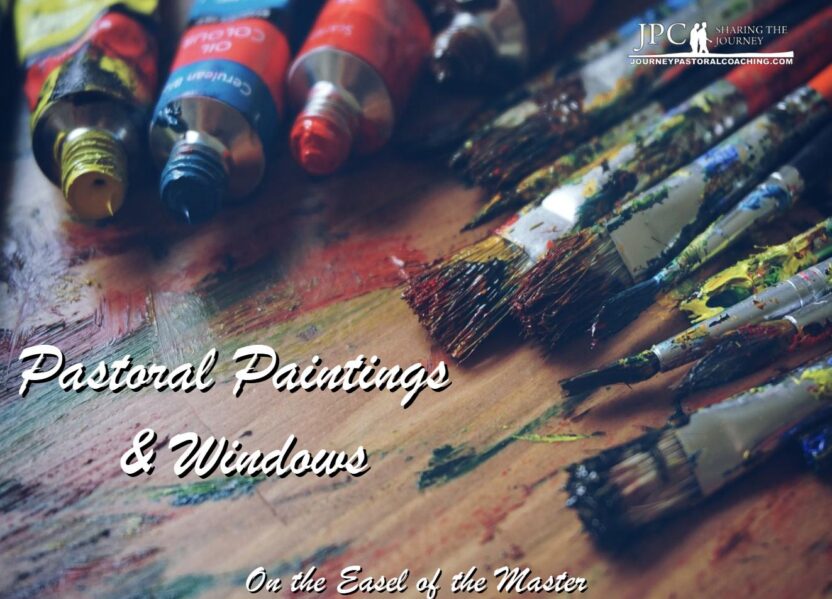Pastoral Paintings and Windows: On the Easel of the Master
In his essential read, Dangerous Calling, Paul David Tripp writes:
“(Pastors must) quit being a painting that (people) gaze at, and start being a window to the One who is your and their hope.”
One of the joys of being a missionary to Western Europe for many years was the privilege of visiting many of its great museums – from Ireland to Greece and almost every country in between. Each was a treasure trove of not just art, but insights into Western Civilization and history. I never tired of visiting them to study their masterpieces and just enjoy the ambiance of these incredible libraries of art.
My family and I were also privileged to visit the homes of famous painters whose works are featured in these museums: da Vinci, Monet, Van Gogh, and Rubens to name just a few. While making our home (we still call it home) in the Borinage region of southern Belgium, our house was just minutes from where Van Gogh lived and served as a missionary pastor (a fact few art historians make known). During our years in France, we lived twenty minutes from where da Vinci spent the last three years of his life in Amboise. We enjoyed visiting his manor house many times.
Visiting these homes brought a wonderful surprise: Not only did we encounter the paintings, but we were able to get to meet the painters, in a manner of speaking. As you tour the house and gardens of Giverny, you enter Monet’s world, and so, his mind and heart; you come to understand perspective. As you tread the paths of Cuesmes, you follow the way that led Van Gogh to the coal mines of Belgium giving him the experiences so powerfully expressed in his works; you come to understand his great anguish. As you stroll casually through the grand rooms of Clos Lucé, so alive with the “presence” of genius and creativity, you almost expect to meet him who many have called the greatest mind of all time, Leonardo himself.
In these artists’ paintings, we see a snap shot of reality as perceived by the painter. But in their homes we see the painters – who they were and how they saw life, truth, and beauty. After visiting their homes, we could never again see their paintings in the same way. Their finished canvases became more than paintings. They became windows into these men’s souls.
So it is for you and me, Pastor. Our lives are the paintings of God, every aspect of our nature, attitudes, words, and actions a tracing of the brush strokes of God in our lives. Where some brush strokes are rich, vibrant, and full of color, others are shallow, sharp, and colorless, evidence of areas in need of more artistic attention. The lack is surely not in the artist, but in the canvas: we have not set on His easel long enough, always in a hurry to jump down and set ourselves in the frames of our museum walls – offices, pulpits, websites, even coffee shops – places where we sit not as windows of the Savior, but paintings of ourselves.
A question, Pastor. How can our people, how can the world, see Jesus in us when we are so little on His easel, so little in the Word and prayer? How can we be anything but a painting of ourselves when we spend so little time under the stroke of The Master’s brushes?
Another question, Pastor. When will we get serious about giving ourselves to this, our first ministry: time alone with God? Spare me the excuse of “quality time.” Read your Bible: Jesus was able to give quality time to others because He had spent “quantity time” with the Father. Read your Bible: He spent whole nights in prayer, even days away in prayer. The result? On Him was the weight of glory: People saw Him and glorified God.
Pastor, until you and I are not just comfortable on God’s easel, but devoted to it, addicted to it, each of us will remain only a two-dimensional painting of our own ideas and feelings about God. We won’t even be a painting of Jesus, much less a window through which people see not us, but God.
What’s it going to be, Pastor: a ministry life that is a copy of a copy of a painting of Jesus or the real thing: a window of Him who is worthy of all glory?
NOTE: Journey Pastoral Coaching exists to provide pastoral coaching to Millennial ministers.
Saddled with large student debt, just beginning to set up homes and start families, and serving in low paying first and second positions, Millennials are those who most desire but can least afford to pay for pastoral coaching.
We are able to do so thanks to the faithful and generous support of individuals and churches like yours who want to see young leaders not only enter the ministry, but remain in the ministry.
Now, more than ever, we need your help.
If you or your church would like to help Millennial ministers across the US and overseas build strong for a lifetime in ministry, please click here to support Journey monthly or with your one-time gift. Thank you.
We also invite you to click and subscribe to our twice-monthly blogs at journeypastoralcoaching.com



